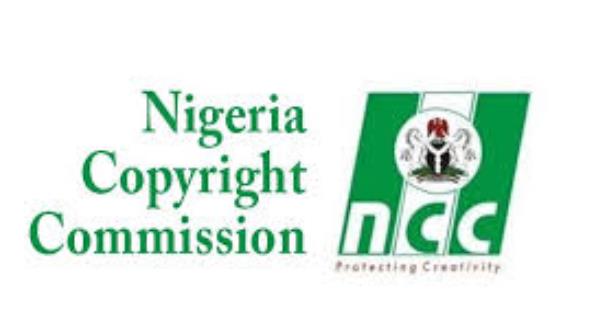Broadcasting
NCC Partners MOPPAN, Set to Reintroduce Hologram Stamps

Nigerian Copyright Commission (NCC), in collaboration with stakeholders, will soon reintroduce the hologram scheme to boost copyright regulation and anti-piracy interventions in selected copyright industries.

Mr. John O. Asein, director-general of NCC, disclosed this recently in Abuja while receiving a delegation of Motion Pictures Practitioners Association of Nigeria (MOPPAN) and Arewa Film Makers Association of Nigeria (AFMAN) led by Dr. Ahmad M. Safari, MOPPAN national president.
Mr. Asein stated that the Commission would collaborate with the National Film and Video Censors Board (NFVCB) and all relevant stakeholders to ensure that the reintroduction of the hologram stamps would strengthen the Commission’s renewed enforcement drive by aiding the identification of genuine copyright works.
The Commission and MOPPAN representatives also discussed various strategies to sanitise the production and distribution channels in the movie industry, particularly in the northern part of the country.
He noted that while much of copyright dealings were now online, there was still a huge volume of works in the physical space.
Expressing regret that some vested interests had scuttled the implementation of the hologram scheme when it was first introduced by the Commission over two decades ago, he indicated that the scheme would be reintroduced to run first as a voluntary scheme and eventually be made mandatory for certain categories of works.
“All we want is to have a credible, a security marker that would enable the average man on the street distinguish between original and pirated copyright works. This would strengthen the anti-piracy drive of the Commission and enhance copyright protection,” he stated.
The director-general also expressed concerns about the proliferation of dubbing and voice-over of foreign movies which he said constituted copyright infringement under Nigerian copyright law and warned perpetrators to desist from such illegal acts.
Observing that the Commission has a duty to protect the interests of foreign copyright owners as much as other countries have obligations to protect Nigeria’s copyright interests, he cautioned that the Commission would intensify efforts to arrest and prosecute all forms of criminal copyright infringement.
“We must take necessary steps to check the infringing voice-over of local and foreign movies. We may have to combine our powers over piracy with the powers of the NVFCB over uncensored movies, first to enlighten the public and eventually clean up the streets of such criminality across the country” he stressed.
Decrying the socio-economic damage that pirates and copyright thefts cause, Mr. Asein reassured MOPPAN that the Commission would continue to institute and implement policies that would further encourage and secure investments in the copyright industry while making piracy less attractive.
“Nigeria at 60 gives us the creative sector an opportunity to look inwards and celebrate Nigeria. I assure you that, going forward, the Commission will be available to walk the streets and markets with you to send the message in very clear terms that Nigeria is not a dumping ground for foreign movies, with or without voice-over. We should promote this administration’s policy of Nigeria first in the entertainment industry”, he stated.
He appealed to film makers to patronize only legitimate replicating and duplicating plants to further discourage piracy.
The director-general urged stakeholders to support NCC’s regulatory and enforcement initiatives, stressing that despite the challenges of inadequate operational facilities, the Commission remained committed to discharging its statutory mandates.
He gave an assurance that the Commission would review and provide practitioners in the various copyright industries with model contracts to help safeguard their rights and promote rancour-free copyright dealings.
The director-general also disclosed that the Commission has introduced major policy initiatives to respond to the peculiar needs in the copyright industry, such as boarder and international ports policing, the Online Enforcement Unit, the regulation of duplicators, as well as intensified raids of piracy hotspots across the country.
Speaking earlier, Dr. Safari, national president of MOPPAN, identified the main challenges undermining the growth of the movie industry as piracy; illegal voice-over on foreign movies in the Hausa language; unauthorised content upload on social media platforms; and lack of model contractual agreements in the film industry.
While appreciating the efforts of the Commission at repositioning the creative industry, Dr. Safari urged the NCC to sustain its partnership with stakeholders across all the sectors of the copyright industry.
The MOPPAN National President was accompanied on the visit by the Chairman, MOPPAN in the F.C.T., Alhaji Habib Barde Mohammed; National Coordinator of Arewa Film Makers Association of Nigeria (AFMAN), Alhaji Ahmad Turaki Kaka and MOPPAN Secretary, Mr. Dalhatu Sule.
Directors of the Commission in attendance were the Director, Regulatory Department, Mr. Augustine Amodu; Director, Nigerian Copyright Academy (NCA), Mr. Mike Akpan; Director of Enforcement, Mr. Obi Ezeilo; and the Director, Public Affairs, Mr. Vincent A. Oyefeso.
Broadcasting
DStv Revenue Plunges as MultiChoice Loses Nearly 4m Subscribers

MultiChoice, Africa’s leading entertainment provider and operator DStv, has warned shareholders to brace for tougher times as the company struggles in a challenging economic climate.

MultiChoice has seen its DStv subscribers decline from over 23 million to 19.3 million in less than two years.
A huge portion of the subscriber loss happened outside its home of South Africa.
In an earlier statement, MultiChoice attributed the steep decline to economic pressures in key markets, particularly Nigeria.
“The loss in the rest of Africa has been primarily due to the significant consumer pressure in Nigeria, where inflation has remained above 30% for the majority of the last 12 months and, more recently, due to extreme power disruptions in Zambia,” the company said.
The company’s latest voluntary operational update, released in preparation for its financial results for the year ending March 31, 2025, reinforces the severity of its current challenges.
MultiChoice noted that the “challenging consumer environment has resulted in a decline in subscribers and limited revenue growth,” underscoring the financial strain faced by the company.
This development came amid increasing regulatory scrutiny, with Nigeria’s Federal Competition and Consumer Protection Commission (FCCPC) recently filing charges against MultiChoice for allegedly violating local regulatory directives.
Broadcasting
Court Fixes May 8 for Judgment in MultiChoice, FCCPC Dispute over Price Hike

Justice James Omotosho of the Federal High Court in Abuja has fixed May 8 for judgment in the suit filed by MultiChoice Nigeria Limited against the Federal Competition and Consumer Protection Commission (FCCPC).

Justice Omotosho fixed the date after lawyers representing the parties adopted and argued their written addresses for and against the suit.
The court had earlier restrained the Commission from taking “any administrative steps” against the plaintiff following an increase in the service price of two of its brands; DStv and GOtv.
The restraining order was a sequel to a formal request by MultiChoice seeking the court’s protection from planned sanction from the FCCPC, over the increase in the price of DStv and GOtv.
At the proceeding, the court granted the Commission’s request for an extension of time to regularise its processes and also allowed the plaintiff to withdraw its application for interlocutory injunction which has been overtaken by event.
Arguing its case, MultiChoice through Moyosore Onigbanjo, SAN, its lead counsel, submitted that the bone of contention is “whether the defendant have the right to control the price at which the plaintiff offers its services to the public.”
While acknowledging the regulatory powers of the Commission, the senior lawyer argued that the Act establishing the FCCPC did not confer on it the powers to regulate price or prevent anyone including the plaintiff from increasing its prices.
Besides, Onigbanjo stated that the issue of whether the defendant can regulate price has been litigated before between the two parties, adding that the Tribunal had held that the Commission has no powers to regulate prices of goods and services in the country, except the President of the Federal Republic of Nigeria.
The Plaintiff’s lawyer also submitted that even the president who is clothed with the powers to regulate prices has maintained “that his government does not believe in price control” but, that prices are determined by market forces of demands and supplies.
The plaintiff in addition submitted that if the FCCPC has no powers to control price “where does he have the powers to prevent the plaintiff from increasing price.
MultiChoice subsequently accused the Commission of discrimination, stating that all businesses in the country have been increasing their prices in line with economic conditions and inflation without the Commission raising an eyebrow, save with the plaintiff.
He, therefore, urged the court to grant all the reliefs sought in the suit.
While adopting his counter affidavit in opposition to the suit, Professor Joe Agbugu, SAN, lead counsel for the defendant, urged the court to first address the cause of action; which is the the issue of increase in the price of DStv and GOtv.
Agbugu disclosed that the Commission on February 25, wrote the plaintiff after it announced price increase effective from March 1, 2025.
According to the senior lawyer, MultiChoice was summoned to appear before the Commission on February 27, “they wrote that it was not convenient and proposed March 6. We then said that in the interim they should hold on with the price increment.”
Agbugu further stated that, “there was no issue of price regulation or fixing as at the time the action commenced.”
Besides, he claimed that the statute establishing the FCCPC, gave it “powers to check exorbitant pricing” and also powers to “regulate abuse of dominant position in the market” as it relates to prices and passing of cost to the consumer.
“The plaintiff occupies a dominant position in the television and entertainment,” Agbugu claimed, adding that the case before the court is not of price regulation but the powers of the Commission to investigate prices that are deemed exploitative and abuse of dominant position.
“The Commission is not to tell you to use price A or B but to determine that the price is exploitative” he said, “they ran away to be investigated over their planned action.
“Our action is not about price fixing; the issue is about whether the price is exorbitant…the mandate of the Commission is to protect the consumer.”
Reacting to the claim of discrimination, defendant’s lawyer, submitted that, “abuse of dominant position qualified them to be singled out for exorbitant pricing.”
Agbugu subsequently urged the court to strike out the suit and dismiss it because it attacks the major task of the Commission of protecting consumers.
“The suit should be dismissed and the plaintiff returned to us for investigation,” he added.
Responding, Justice Omotosho announced that, “judgment is reserved to May 8.”
Broadcasting
From Struggle to Stability: How FinTech is Helping Nigerian SMEs Overcome Cash Flow Challenges

When Mrs. Agbaje started her school in Ibadan twelve years ago, she didn’t envision a tech-enabled future. Her dream was simple—provide affordable, quality education to children in her community. For the most part, she made it work. But as the school grew, a new challenge took root. It wasn’t infrastructure. It wasn’t teacher retention. It was something far more basic: getting paid.

Each new term brings the same pattern. Parents promise to pay fees “by next week.” Some follow through. Many don’t. As the term wears on, Mrs. Agbaje finds herself juggling spreadsheets, reminder texts, and awkward conversations in car parks or at school gates. Meanwhile, salaries must be paid, books restocked, diesel bought. More often than not, she dips into personal savings to keep things running.
Her story is common across Nigeria. Small businesses—whether they’re schools, salons, logistics firms, or cooperative groups—are constantly navigating the emotional and financial toll of delayed payments. And it’s not just a matter of inconvenience. A recent study by MacTay Consulting found that Nigerian SMEs wait between 60 to 120 days on average to receive payment for services or products already delivered. That kind of delay is more than a hiccup. It threatens livelihoods. It blocks growth. It’s a silent killer.
For Chuks, who runs a car hire service in Enugu, the issue is tied to his bigger corporate clients. They insist on “net 30” or “net 60” terms—industry-speak for “we’ll pay you in a month or two.” That might be manageable for a large fleet with strong cash reserves, but for someone like Chuks, every week matters. With fuel prices rising and maintenance bills stacking up, he’s often forced to park cars because he doesn’t have the cash to fix them—even when work is lined up.
What links these stories is the reality that small businesses operate in a system where money is constantly in motion but rarely on time. Customers often mean well, but their own financial instability creates a domino effect. And the existing tools to manage payments—handwritten ledgers, POS machines, WhatsApp reminders—were never designed for structure. They’re patched solutions to a systemic problem.
Even digital banking, for all its advancement in Nigeria, hasn’t solved this issue. Many SMEs still operate informally, managing finances through personal bank accounts or apps not tailored to business needs. The result is a messy web of follow-ups, reconciliations, and emotional strain. Business owners become debt collectors, chasing down what they’ve already earned, time and time again.
What’s often missed in conversations about entrepreneurship is just how deeply this problem cuts. Payment delays mean rent can’t be paid on time. It means holding off on hiring a new staff member, or letting go of a part-time assistant. It means saying no to growth opportunities, not because they’re not viable, but because the cash flow isn’t predictable enough to take the risk.
And when you zoom out, the implications are national. Small businesses make up over 90% of enterprises in Nigeria. They contribute nearly half of the country’s GDP and employ a significant portion of the workforce. Yet, their greatest enemy isn’t market competition—it’s irregular income. This is a structural inefficiency that deserves far more attention than it gets.
Slowly, however, change is beginning to show. A quiet revolution is underway—one where technology is stepping in not as a trend, but as a tool for financial stability. More SMEs are beginning to explore digital solutions that streamline payments and reduce friction between businesses and customers.
Among these solutions is PaywithAccount, a new tool launched by Nigerian fintech company OnePipe. Designed specifically for businesses with recurring payments—schools, cooperatives, service providers—it allows them to automate collections directly from customers’ bank accounts. With full consent and transparency, payments can be scheduled, reducing the need for repeated follow-ups or awkward reminders.
For Mrs. Agbaje, this has made a significant difference. Parents receive structured payment plans, reminders go out automatically, and debits happen based on prior agreement. She now spends less time tracking who has paid and more time planning curriculum upgrades and engaging with teachers.
The benefit isn’t just financial—it’s emotional. When business owners don’t have to chase payments, they gain time, clarity, and confidence. They can plan ahead, restock inventory, or finally invest in that expansion they’ve put off for years. And for customers, the experience feels more professional, more trustworthy. Everyone wins.
Technology won’t solve every problem for Nigerian SMEs. But smart, well-designed financial tools are starting to remove some of the biggest roadblocks—quietly and effectively. And that’s the point. The best systems aren’t flashy. They work in the background, reducing stress, restoring dignity, and enabling business owners to focus on what truly matters.
For Ope Adeoye, founder of OnePipe, the issue is personal. “Every Nigerian knows someone who runs a business—a cousin, a friend, a neighbour. When they suffer from late payments, it affects whole families and communities. Fixing this isn’t just a business goal—it’s a social one.”
In a country as dynamic and entrepreneurial as Nigeria, the challenge is rarely about lack of ideas. It’s about systems that help those ideas survive. And one of the most overlooked systems is the way money flows—or fails to.
As more SMEs embrace tools that put payment on autopilot, a future of stability—rather than constant survival—starts to feel possible. And in a nation powered by small businesses, that kind of shift could move mountains.

 Telecom2 days ago
Telecom2 days agoMTN, Lynk Global Make Africa’s First Satellite-to-Mobile Call

 General News2 days ago
General News2 days agoSERAP Asks National Assembly to Drop Bill to Jail Nigerians who Fail to Vote

 E-Business2 days ago
E-Business2 days agoSystemSpecs’s Subsidiary Deelaa Becomes Whatadeal

 E-Financial2 days ago
E-Financial2 days agoNigeria Gets Fresh $500m World Bank Loan for Economic Stimulus Programme

 E-Financial2 days ago
E-Financial2 days agoUninsured Depositors of Heritage Bank to Receive Liquidation Dividends In April – NDIC

 Telecom2 days ago
Telecom2 days agoSmart Treasure Investment Team’s Initiatives Eradicate Poverty, Says Aminu

 E-Business2 days ago
E-Business2 days agoCybersecurity Firm Says It’s Time to Back it Up, As the World Marks World Backup Day

 General News2 days ago
General News2 days agoFG to Elevate Enugu Tech Festival to National Event – Minister
























